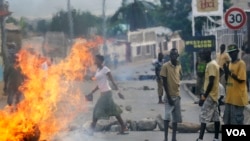East African Community leaders say Burundi elections should be delayed at least six weeks.
A statement following an emergency regional summit Sunday also called "on all parties to stop violence," for disarming youth groups and for creating "conditions for the return of refugees" who have fled political violence.
Burundi's foreign minister represented the country as President Pierre Nkurunziza did not attend the meeting of leaders and ministers from Kenya, Rwanda, Tanzania, and Uganda in Tanzania. South African President Jacob Zuma also joined the talks.
Nkurunziza's decision to run for re-election has sparked weeks of protests, in which more than 20 people have died in clashes between protesters and police. Earlier this month some of the president's critics staged an unsuccessful coup while he was attending an EAC summit.
The president's critics say a third term would violate the constitution. His supporters say he is eligible to run because parliament, not voters, elected him to his first term in 2005.
Burundi's Catholic Church has withdrawn support for the presidential election scheduled for June 26 and asked its clergy step down from electoral commissions.
The European Union is suspending its election observer mission in Burundi because it says the election process has been "marred by restrictions on independent media, excessive use of force against demonstrators, a climate of intimidation for opposition parties and civil society, and a lack of confidence in the election authorities."
Burundi's Interior Minister Edouard Nduwimana said Friday the withdrawal of the Catholic Church and the EU "does not mean the elections should not take place." He said "the Burundian people are thirsty for these elections and we need to do everything so they take place in good conditions."
The political opposition recently broke off peace talks after opposition party leader Zedi Feruzi and his bodyguard were killed in a shooting in Bujumbura. A human rights activist, Pierre Claver Mbonimpa, told VOA's Central Africa Service those talks resumed on Thursday.
The United States has condemned the killings and urged Burundian authorities to arrest the perpetrators and protect other politicians. Washington has also called for Burundi authorities to lift a ban on protests, allow independent radio stations to resume broadcasting, and stop using the term "insurgents" to refer to peaceful protesters.
More than 100,000 Burundians have fled to neighboring countries to escape the violence between protesters and the police.






